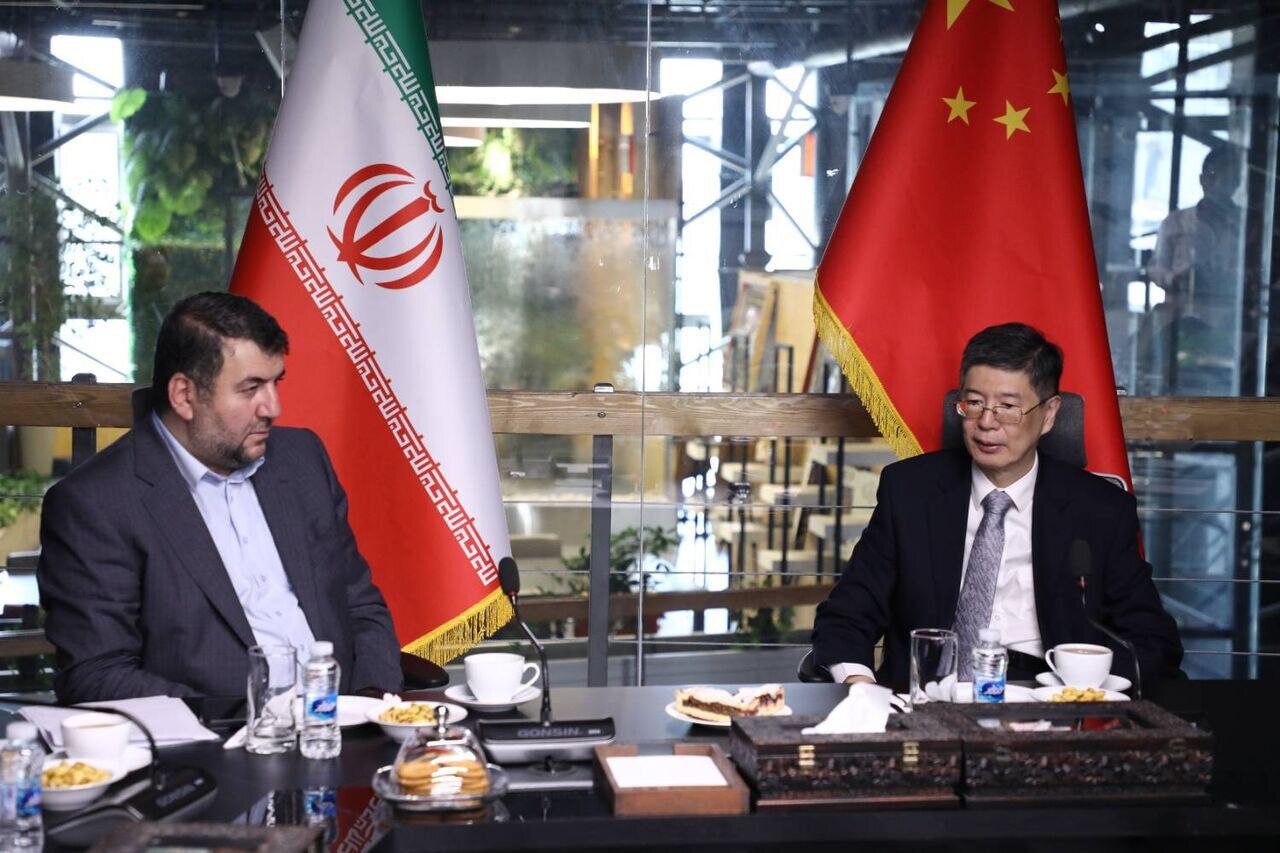Tehran, Peking beef up sci-tech ties

TEHRAN – The head of the Organization for the Development of International Cooperation in Science and Technology, Hossein Roozbeh, and Chinese Ambassador to Iran Cong Peiwu have explored the avenues for the expansion of scientific and technological collaborations between the two countries.
The officials met on Wednesday following Peiwu’s visit to Tehran branch of Iran House of Innovation and Technology (iHiT), Mehr news agency reported.
Having visited the iHiT in Tehran, the Chinese official said, “Iran possesses a magnificent civilization and is home to intelligent people who have made great achievements. The country’s history of technology development is glorious. Today, we are proud to witness Iran’s rapid technological advances in the modern era. China and Iran are two great civilizations with long histories, and the two countries have great potentials for fostering scientific cooperation.”
Referring to Iran’s Vice President for Science, Technology, and Knowledge-Based Economy, Hossein Afshin’s, recent visit to China and the country’s open approach to international cooperation, the official said we believe there are many potential avenues for enhancing partnerships between the two countries.
For his part Roozbeh stressed the need for promoting and accelerating scientific cooperation between Iran and China, highlighting that the two nations have a long-standing history of scientific, technological, economic and trade collaborations.
Iran’s science and technology ecosystem has made significant progress in recent years, with more than ten thousand knowledge-based companies operating in the country. The contributions of the highly-skilled and talented workforce have created major opportunities for the development of joint cooperation, he said.
Referring to the memorandum of understandings (MOUs) singed by Afshin and Ding Zhisheng, the Vice Premier of the People’s Republic of China, on the sidelines of the 2nd Belt and Road Conference on Science and Technology Exchange in June, the official announced Iran’s full readiness to implement the made agreements.
Underscoring china’s notable capabilities in artificial intelligence (AI), and Iran’s progress in the field, Roozbeh said the two countries partnerships in AI will bring about invaluable achievements to the region and the world.
The official went on to say that the establishment of BRI (Belt and Road initiative) LabsNet will play a crucial role in the expansion of scientific interactions at international scale.
The two countries have also agreed on exchanging researchers, young scientists, and elites as well as participating in each county’s exhibition. The collaborations include joint efforts in technology, health and medicine, environment, agriculture sectors.
The official also noted that Iran will inaugurate the first iHiT in China within next few months.
*****China interested in developing scientific co-op with Iran
The 2nd Belt and Road Conference on Science and Technology Exchange took place in Chengdu, the capital of southwest China’s Sichuan Province, from June 10 to 12.
Zhisheng met Afshin on the sidelines of the three-day conference. He voiced China’s willingness to boost scientific and technological cooperation with Iran within the framework of the BRI.
Referring to the achieved agreements between the two countries, the Chinese official said China is willing to effectively implement the Iran-China strategic partnership and promote high-quality cooperation within the framework of the BRI. “We seek to further develop the capacity for cooperation in science and technology between the two sides to bring more tangible benefits to the people of both countries,” IRNA quoted Zhisheng as saying.
For his part, Afshin said Iran is interested in enhancing ties with China to achieve breakthroughs in major scientific and technological cooperation.
China and Iran formally defined their bilateral relations as a Comprehensive Strategic Partnership (CSP) in early 2016, when President Xi Jinping paid a visit to Iran. The strategic relationship has seen robust development since then.
Iran has demonstrated its full support for China in various issues, from those related to China’s core national interests and major international agendas proposed by China, such as the Belt and Road Initiative (BRI). China has also strongly supported Iran’s legitimate quest on many issues. China supported Iran’s legitimate position on the Joint Comprehensive Plan of Action (JCPOA), Iran’s position on women’s rights, and membership in the Shanghai Cooperation Organization (SCO) and BRICS.
Addressing the second conference, Afshin proposed six strategic plans to boost technological ties along the Silk Road. The six proposals are based on national capacities, operational experiences, and a region-oriented perspective, IRNA reported.
The first plan focused on the establishment of BRI (Belt and Road Initiative)-TechMatch platform to adapt affordable and indigenize technologies to the needs of developing countries.
The establishment of a regional center in Tehran for future studies and monitoring technology for member states in the BRI was the second recommendation.
The third suggestion involved launching a BRI LabsNet. To ensure high-quality technology exchange and provide affordable technology, Iran proposes launching a multinational network of specialized laboratories to test and evaluate equipment and technologies produced in countries of the BRI, which is a step towards enhancing mutual trust and facilitating technological trade.
Implementing a regional technological skills training program focusing on youth in countries of the BRI was the fourth presented plan.
Developing a technological cooperation charter for the countries of the BRI with a focus on ethics, data governance, and fair technology transfer was the last proposal.
MT/MG
Leave a Comment